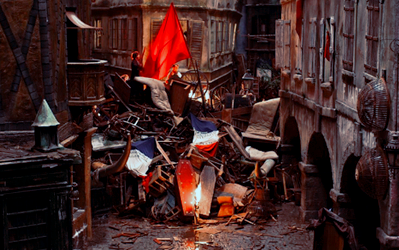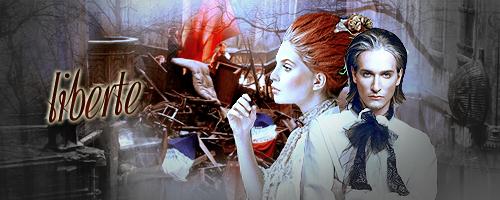Post by MICHEL MONTPARNASSE on Apr 5, 2013 13:29:01 GMT -5
| [atrb=cellSpacing,0,true][atrb=border,0,true][atrb=style, width: 460px; background-image: url(http://i44.tinypic.com/34fb0ns.jpg);-moz-border-radius: 0px 0px 0px 0px; -webkit-border-radius: 0px 0px 0px 0px; border: 4px ridge #7a9aa9, bTable][tr][cs=2] Michel Montparnasse. 19. Citizens—Patron-Minette. Douglas Booth. | |
[rs=2] | (Italicized sections quoted from the Hapgood translation of Victor Hugo's Les Miserables) A lugubrious being was Montparnasse. Montparnasse was a child; less than twenty years of age, with a handsome face, lips like cherries, charming black hair, the brilliant light of springtime in his eyes; he had all vices and aspired to all crimes. […] Curled, pomaded, with laced waist, the hips of a woman, the bust of a Prussian officer, the murmur of admiration from the boulevard wenches surrounding him, his cravat knowingly tied, a bludgeon in his pocket, a flower in his buttonhole; such was this dandy of the sepulchre. Montparnasse is young, and this youth is obvious in him. He's a good-looking young man, handsome enough to turn heads. A dandy, he tries very hard at that finery of dress—though none of it was obtained through honest means by this consummate denizen of the Parisian underworld. His appearance is mostly pretension, the trappings of a man far above Montparnasse's place in the world, but it is important to him and something of which he is extremely aware. He was genteel, effeminate, graceful, robust, sluggish, ferocious. [...] He lived by robbery with violence. His coat was of the best cut, but threadbare. Montparnasse was a fashion-plate in misery and given to the commission of murders. The cause of all this youth's crimes was the desire to be well-dressed. The first grisette who had said to him: "You are handsome!" had cast the stain of darkness into his heart, and had made a Cain of this Abel. Finding that he was handsome, he desired to be elegant: now, the height of elegance is idleness; idleness in a poor man means crime. Montparnasse is the product of the streets that raised him. The desire for good things and comfort could not find a legal outlet for him; he rebelled from the prospect of honest work, and glancing at it from the outside, felt that there was no reward for it. By stealing, he gets whatever he wishes quickly, without exhausting himself or limiting his freedom. Other men might spend their days sweating at trades, but Montparnasse feels that he can take all he needs in the night. He is vain, a trait amply reflected in his dandyish behavior. He enjoys the attention of women. He is generally selfish, with few concerns beyond himself: nothing has ever taught him to have concern for others or value their lives. He kills freely, and without remorse. From the dead he can get those things he wants, and a dead man cannot scream for the police or come back to get revenge. To Montparnasse, of course, there are more reasons to kill than just convenience. Like many street children, his early life was marked by fear of those stronger than himself. In learning to kill, he also learned one way in which he can hold power over anyone—bourgeois or beggar, aristocrat or guardsman, if Montparnasse can slip a garrote around the neck or a knife between the ribs, he holds power over life and death. For a young man far more used to powerlessness, the feeling was intoxicating. He likes being recognized and feared. Typically, he prefers to kill with a garrote—but will use a knife if necessary. The digestion of evil aroused in him an appetite for worse. It was the street boy turned pickpocket, and a pickpocket turned garroter. […] Few prowlers were so dreaded as Montparnasse. At eighteen, he had already numerous corpses in his past. More than one passer-by lay with outstretched arms in the presence of this wretch, with his face in a pool of blood. Montparnasse was not always a killer. The boy had never known his father, but his mother named him Michel. At that time, if he had had some other part to his name, he did not know it. His mother and the other ladies spoiled him sometimes, as best they could, but the call toward the streets was strong. He liked the sweets he might be offered now and then, but he disliked much else that it involved—and especially the blows of strangers. There were other advantages in slipping out into the streets as well, even when he was not instructed to do so in order to leave his mother alone with some man for a few hours' time—he might still receive the occasional treat from the ladies when he returned, but there in the street was a wealth of other opportunities for him. An attractive child, but lean and underfed, he learned well before the age of ten that he could take advantage of strangers' pity toward him. With age he began to resent their pity, but this only steeled him against them: they wanted to give him things because they felt sorry for him, well, better to take before they had the chance! He was the clever one, the strong one, the one who could disappear back into some unknown corner with a handful of coins or a glittering gold pocketwatch. His unknown corner was, far more often than not, the catacombs beneath the city's streets. The bones did not terrify him, certainly not after the first few times he followed the other gamins down into the darkness. Quickly the tangled labyrinth of the dead became his most natural environment, a place he could navigate without light, completely blind, and lose any pursuer. He began to spend more time there than he did with his mother, and it was from this place that he drew the second part of his name. Montparnasse, the district above “his” catacombs. He liked the sound of it, though he knew nothing of its meaning. In pickpocketing, he found his living—but the state of constant flight did not please him. Streaked with dirt, people—even older thieves—looked down on him, and he resented this. The first time he killed a man, it was in desperation. Montparnasse was not used to being pursued into the catacombs, and if he was—he was used to being able to quickly and easily lose whoever chased him. He carried a knife, for practical purposes and as protection against the bigger boys who might try to take from him what he had taken from others. He was agile and strong, but thirteen years made him smaller than many other thieves. It had hardly even been a lucrative strike, this man he had pickpocketed and who had begun to chase him—a few francs, and a pretty little silver pocketknife. But somehow, the man seemed to know the paths that Montparnasse himself chose. He was afraid; if captured, what would the man do to him? He ran, knowing that he was being driven into a dead end. His bones would lie here among the others, and no one would ever know the difference... But when the man had cornered him finally, it occurred to Montparnasse in that last desperate moment that he did not have to be the one to leave the confrontation as a corpse. He drove his knife into the man's side, and he slumped—but was not dead. Throwing himself onto his attacker's back, he choked him, clinging desperately to avoid being thrown off. He realized, after a few moments, that the fight was over. He had won. Fear flooded him for an instant, but then a sort of fascination. He went through the corpse's pockets, finding little more of use. His prize was not the objects, not the few francs—but the realization that he was able to kill. He could be feared, and the thought gave him a thrill. To work with the Patron-Minette is mainly a matter of convenience for Montparnasse, and any loyalty he has to the Thenardiers is weak. His relationship with Eponine is often rather complicated; off-and-on, without any real love—though perhaps there was at least a genuine affection at one time, they've both changed since then. For a roleplay sample, see any of my posts with my other characters I suppose XD |
Ashley. 21. RPG-D. |




